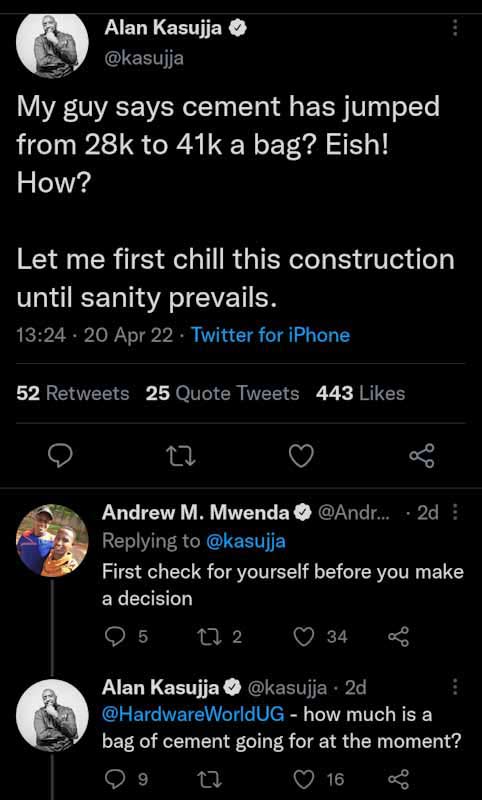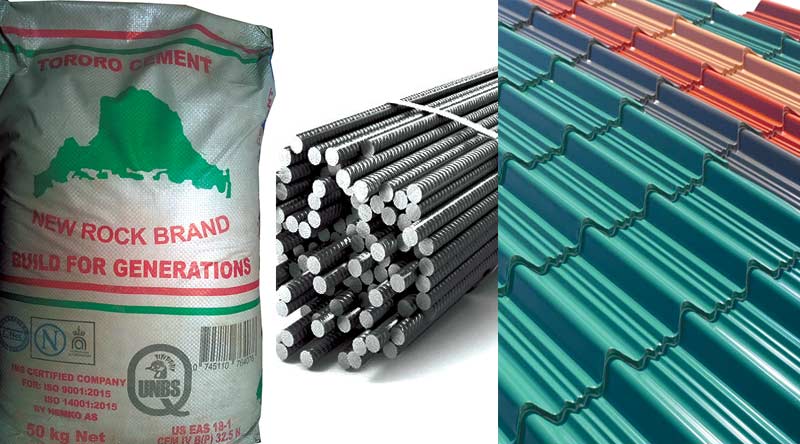Business
Sharp rise in prices of hardware products puts construction jobs at risk
The construction sector has been one of the most resilient industries in the recent past to the point that it largely withstood the COVID-19 lockdown. Now however, a sharp rise in prices of key construction materials such as cement, iron sheets and iron bars has forced managers of hardware shops as well as owners of most sites to suspend stocks and work respectively.
An brief survey by this newspaper indicates that the price of cement has risen from about UGX30,000 recorded around December/ January 2021 to around UGX38,000 in Kampala and Wakiso and UGX40,000 in upcountry areas.
Prices of other items such as iron sheets have also risen. The price of Uganda Baati’s Super Eco iron sheet that was selling at 48,000 late last year has gone up by about UGX9,000 to UGX10,000 and now sells at or above UGX57,000.
Iron bars, too have not been spared the price rise. One Y12 iron bar that was selling a 35,000, has now increased to above UGX50,000, while the price of Y16 now goes for UGX85,000 from about UGX65,000 two months ago.
Reports by a Ugandan daily last week indicated that cement manufacturers have been facing challenges importing Clinker, a key raw material used in cement production. The newspaper quoted some sources who blamed the shortage of clinker on lockdown effects in source countries.
But when this reporter contacted Tororo’s Marketing Manager a one Mohan, he said; they have not increased prices, before he switched off the phone.
But small hardware dealers indicate that they are finding it difficult to access stock from the company.
Paul Kyeyune, who is involved in managing construction sites for Ugandans in the diaspora, says he went to Tororo to buy one trailer of cement, but was turned away as the company said it now deals with big companies.
“The company told us they now deal with only big companies such as Cheap and Hardware world. They turned all of us who wanted one trailer away,” Kyeyune said.
John Mutebi (not real for purposes of hiding his identity because he is employed with a sub-contractor with Kasese based Hima cement) told this newspaper that the shortage of cement has been occasioned by cutbacks by hardware dealers of Hima cement due to complaints about quality of the product.
“The company reduced production after people complained of poor quality,” hinted Mutebi.
According to Kyeyune, the decline in the quantities made available by Tororo and other cement producers, has been made worse by dealers who have resorted to hoarding the product for profiteering purposes.
“Some of the dealers are now keeping cement in warehouses and only bring it in stores in small quantities. They are worsening the shortage by hoarding products, after all they have the perfect excuse of higher fuel prices to get away with exploiting their customers,” said Kyeyune.
The rise in prices of construction materials has sparked conversations and speculations in the public that merits the government’s further attention and investigation.

Ugandan BBC Presenter Allan Kasujja took to Twitter to vent his frustration with the rise in prices of construction materials
Impact on jobs
Sharon Nakyanzi, a hardware dealer in Kajjansi along Entebbe road, advises her customers to put on hold major purchases of cement and other products. She argues that she hopes prices to come down in the near future.
“Right now I don’t advise anyone to stock cement. If you do, you may make losses when prices come down,” says Nakyanzi
The challenge however, is that there are no guarantees as to when or whether prices will go down and by what margin.
The increase in prices of construction materials has quite expectedly rendered most builders redundant and without a source of income.
General overall low demand in other sectors of the economy has dampened opportunities for many to get absorbed into other sectors such as the Boda Boda industry or merchandise trade.
Impact on economy
The construction section has been one of the best performing in recent years. The sudden hiccups are likely to dent the government’s tax revenue targets that were already performing poorly.
As the Permanent Secretary and Secretary to the Treasury Ramathan Ggoobi reported last week, the government has recorded a revenue deficit of over UGX1 trillion.
In responding to the widespread public outcry about inflation, Ggoobi said the government will implement policies to reign in further increases in prices.
“The main causes of the increases in prices of most consumer goods are external. However government will continue implementing the necessary fiscal and monetary policies to ensure that these high consumer prices are contained,” Ggoobi Promised.
Ggoobi reiterated the government’s readiness to support households to recover from the impacts of the COVID-19 pandemic through programmes like Emyooga, the Small Business Recovery Funds are meant to offer a market for goods and services to ensure sustained and inclusive growth.
Comments




























